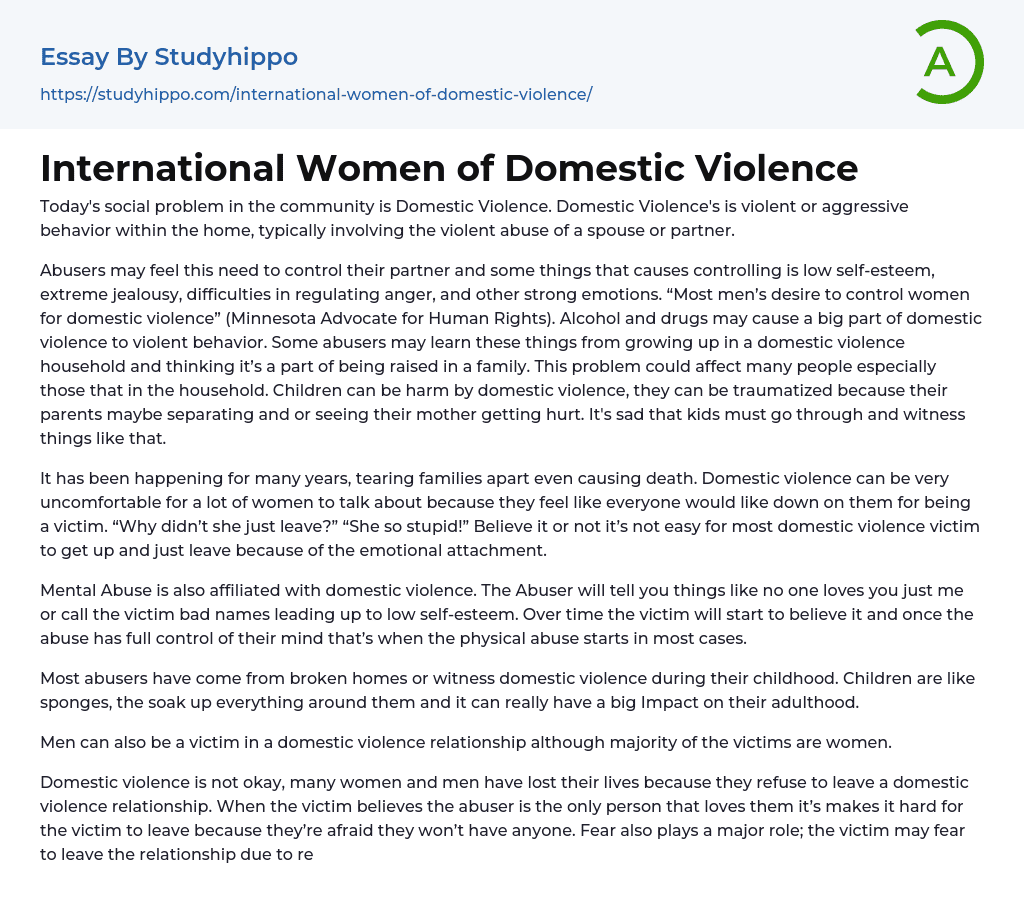The main concern within our community revolves around domestic violence, which refers to violent or aggressive behavior that takes place within a household. This type of conduct typically involves the mistreatment and abuse inflicted upon a spouse or partner.
Abusers may exhibit controlling behavior due to a need for dominance over their partner, which can be influenced by factors such as low self-esteem, extreme jealousy, difficulty managing anger, and other intense emotions. The Minnesota Advocate for Human Rights states that many men demonstrate this desire for control over women in cases of domestic violence. Additionally, substance abuse (specifically alcohol and drugs) often plays a significant role in escalating domestic violence into physical aggression. Some abusers may have learned these behaviors from witnessing domestic violence during their own upbringing and perceiving it as a normal part of family
...life. This issue has a profound impact on multiple individuals, especially those living together under the same roof.
Children can be harmed by domestic violence, which can cause trauma as they witness their parents separating and their mother being injured. This is a distressing situation for children to experience and see. Unfortunately, this problem has persisted for many years, leading to broken families and even fatalities. Discussing domestic violence can be challenging for women because they worry about being judged as victims. They encounter questions such as "Why didn't she simply leave?" or "She's so foolish!" However, leaving is not simple for most victims of domestic violence due to emotional attachment. Mental abuse is also associated with domestic violence.
The victim's self-esteem diminishes as the abuser manipulates them, either by asserting that nobody loves them except for the abuser or b
using derogatory terms. Gradually, the victim internalizes these statements, enabling the abuse to gain full control over their mind and increasing the chances of physical abuse. Many abusers themselves have encountered broken households or witnessed domestic violence during their childhood, illustrating how children absorb everything around them and how it can significantly impact their adult lives. Although men can also be victims in domestic violence relationships, women constitute the majority of victims. It is vital to recognize that domestic violence is unacceptable since it has resulted in numerous deaths among both women and men who resisted leaving such relationships.
When the victim views the abuser as their exclusive source of affection, it becomes challenging for them to depart because they are afraid of being alone. The fear also plays a significant part; the victim may dread leaving the relationship due to potential revenge. Frequently, the victim is isolated from loved ones and prohibited from any form of contact. The abuser uses these strategies to make it seem like the victim has no support system except for them. It is crucial for parents to talk with their children about identifying warning signs and teaching them that mistreating others is unacceptable.
It is unacceptable for anyone, regardless of gender, to experience abuse in the context of domestic violence. Tittlova (Factors Contributing to Domestic Violence 122) argues that when discussing male victims of domestic violence, the forms of abuse are usually non-physical, such as psychological, economic, or social control. It is commonly assumed that men are mostly the perpetrators of domestic violence; however, women often suffer even more. For example, Mary exercises control over Darius's interactions at his workplace without
physically harming him but by manipulating his actions. I strongly believe that men should not be subjected to domestic violence either. In any relationship, everyone should have the opportunity to experience happiness and trust while loving each other mutually. It is unjust to be mistreated by someone you love or care for.
Victims of domestic violence have several options to consider. They can choose counseling, involve the court by contacting the police, or seek assistance from a domestic aid program. There are also support groups available for individuals facing difficulties when leaving an abusive relationship. In this case, my advice is for victims not to feel foolish and to remember how love can sometimes influence their decision-making.
Many times, we persist and return to people, believing that our love can change them. However, it is widely acknowledged that their behavior remains the same - if not worse. It starts with hurtful comments and leads to isolation, leaving you feeling reliant on them for your survival.
It starts with a physical fight, with shoving or slapping, and then an apology where the abuser denies wanting to hurt you or blames your actions. Over time, you become constantly scared of confrontations and hide the bruises from the few people you can see. You even defend the abuser to prevent others from getting mad at them and making things worse. As a result, you find yourself trapped in a lose-lose situation.
No one desires to feel dissatisfied and trapped, regardless of their actions. Currently, you have two choices: remaining in this situation and risking your children experiencing the same suffering or leaving with them while taking whatever you can. Departing is the
optimal approach to guarantee your baby's well-being. The responsibility to safeguard your children lies solely with you.
It is your responsibility to protect your children from witnessing and experiencing the mistreatment inflicted by their father, as it causes suffering for their mother. This not only endangers them but also puts all of you at risk. If he harms you to the point where you are unable to care for and safeguard your children or, even worse, if he takes your life, it will have adverse effects on everyone involved. Nevertheless, if you are still alive, you have the ability to rectify this situation.




